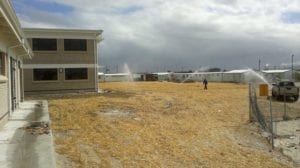Borehole replenishment and yields remain positive at Western Cape schools recently provided with groundwater access to irrigate their fields and green areas.
A programme of continuous monitoring of groundwater usage is proving to be a valuable data gathering exercise, said SRK principal hydrogeologist Leon Groenewald, giving school maintenance contractor’s clear and ongoing guidance on sustainable levels of abstraction. “Our monitoring over the past couple of years has shown that more water was abstracted than was planned, but this was probably not surprising as many of the schools were starting their green areas from scratch and this required more watering,” said Groenewald. As more data is generated over time, he said, the longer term impacts of the boreholes can be tracked from season to season. SRK has been monitoring the water levels with data loggers in the borehole itself, taking readings on an hourly basis, as well as utilising total flow meters in the delivery line to record the volume of water being pumped. The company’s Cape Town office has been involved in this provincial Department of Transport and Public Works programme to find groundwater sources for new and upgraded schools.Over 30 schools have been provided with boreholes as part of this programme over the past three years, saving about 130 000 m3/a of water that would have had to come from municipal supplies.
“This helps take pressure off the supply of potable water, which of course also needs to go through a costly treatment process before being reticulated to consumers and industry,” said Groenewald. “It is much more cost-effective to use borehole water – rather than treated water – for irrigation, and of course the fields and greenery uplift the schools.” Groundwater is an increasingly important resource as South Africa’s economic growth starts to put a strain on its limited surface water supplies; underground aquifers therefore need to be carefully managed so their natural replenishment can keep up with borehole extraction levels.







